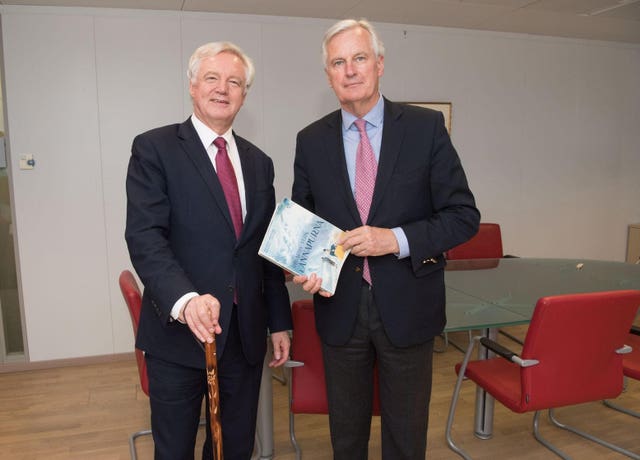Downing Street has insisted the UK will not be in a customs union after Brexit as Tory tensions over the Government’s plans continued to simmer.
The move by Number 10 to “categorically” state the UK will be leaving the customs union came as Theresa May and David Davis prepared to hold talks with Brussels’ chief Brexit negotiator Michel Barnier.
Confirmation of the Government’s approach may placate Tory MPs and ministers who are keen for a Brexit arrangement which allows the UK to strike trade deals around the world – something which a customs union could have prevented.
But business leaders have urged the Government to remain in a customs union and Tory Brexit rebel Anna Soubry urged Number 10 to “do the maths” and listen to company bosses.
She claimed the “hard Brexit” European Research Group (ERG) of Tory MPs, led by Jacob Rees-Mogg, had a “deeply unattractive” plan which involved leaving the customs union “to chase unicorn trade deals” at the expense of existing relations with the EU.
It’s deeply unattractive that the only reason they want to leave #CustomsUnion is to chase unicorn trade deals https://t.co/xeeTCltMx0
— Anna Soubry MP (@Anna_Soubry) February 5, 2018
The intervention by Downing Street sought to draw a line after days of sometimes confused messages from the top of Government about the approach to future customs arrangements.
“It is not our policy to be in a customs union,” a source said.
The source said they would be seeking an “arrangement” with the EU to ensure trade remained as “frictionless” as possible after Brexit.
Some Tories remain suspicious, accusing Chancellor Philip Hammond of seeking to pursue his own policy aimed at keeping Britain as closely aligned as possible with the EU.
The chairman of the Commons Exiting the EU Committee, Hilary Benn, said further detail was still needed from ministers if the terms of a future deal with Brussels are to be agreed by October as hoped.
“I wish it was clarity but I don’t think it is. I think the Government is in a state of open disagreement, the Prime Minister has been immobilised,” the Labour MP told BBC Radio 4’s Today.
“We are 19 months since the referendum, we are nine months to go and we still don’t know what it is we want.”
It was a “profound mistake” to leave a customs union, he said, and it would create the need for checks at the Northern Irish border.
The talks in Downing Street with Mr Barnier will mark the first time Mrs May, Mr Davis and the Brussels official have met since EU leaders gave the green light for the second phase of negotiations to start at their December summit in the Belgian capital.
Since the optimism surrounding that meeting, fresh tensions have emerged after the European side insisted that EU law must continue to apply in the UK throughout the post-Brexit transition period – expected to last around two years.
Mrs May has already made clear that she intends to push back against the bloc’s demands that EU citizens who come to the UK during the transition should enjoy the same rights as those who come before Britain leaves the EU on March 29 2019.
Looking forward to catching up w/ @DavidDavisMP on Monday to discuss UK’s orderly withdrawal, and meet w/ @EBA_News on #Brexit preparedness of EU financial service providers. Next EU/UK negotiation round starts on Tuesday in Brussels: pic.twitter.com/KMKlsrkQQ6
— Michel Barnier (@MichelBarnier) February 2, 2018
Ministers have complained that the demand goes beyond what was agreed at the December summit but senior EU figures – including the European Parliament’s Brexit co-ordinator Guy Verhofstadt – insist it is “not negotiable”.
The Government has also come under fire from its own backbenchers for agreeing that any changes to EU law which are passed during the transition will apply in the UK – even though Britain will have had no say in the decision-making process.
During a testy Commons committee hearing last month, Brexit Secretary Mr Davis was accused by the leading Brexiteer Mr Rees-Mogg of allowing Britain to become a “vassal state” of the EU – a charge he rejected.
The meeting in Downing Street will be followed on Tuesday by the first technical discussions by UK and EU officials in Brussels on the transition arrangements intended to ensure businesses and citizens are not faced with a “cliff edge” break when Britain leaves the bloc.
Meanwhile, senior ministers are also preparing for the first discussions on Britain’s future relationship with the EU by Mrs May’s so-called “Brexit war cabinet”.
Members of the Cabinet Brexit sub-committee will meet on Wednesday and then again on Thursday as they seek to thrash out an agreement on thorny issues such as the customs arrangements with the remaining EU27.

Over the weekend, Home Secretary Amber Rudd brushed aside warnings from hardline Brexiteers that Mrs May could face a leadership challenge if she fails to deliver a “clean Brexit”.
Ms Rudd said ministers would not be intimidated and insisted that there was greater agreement around the Cabinet table than MPs sometimes realised.






